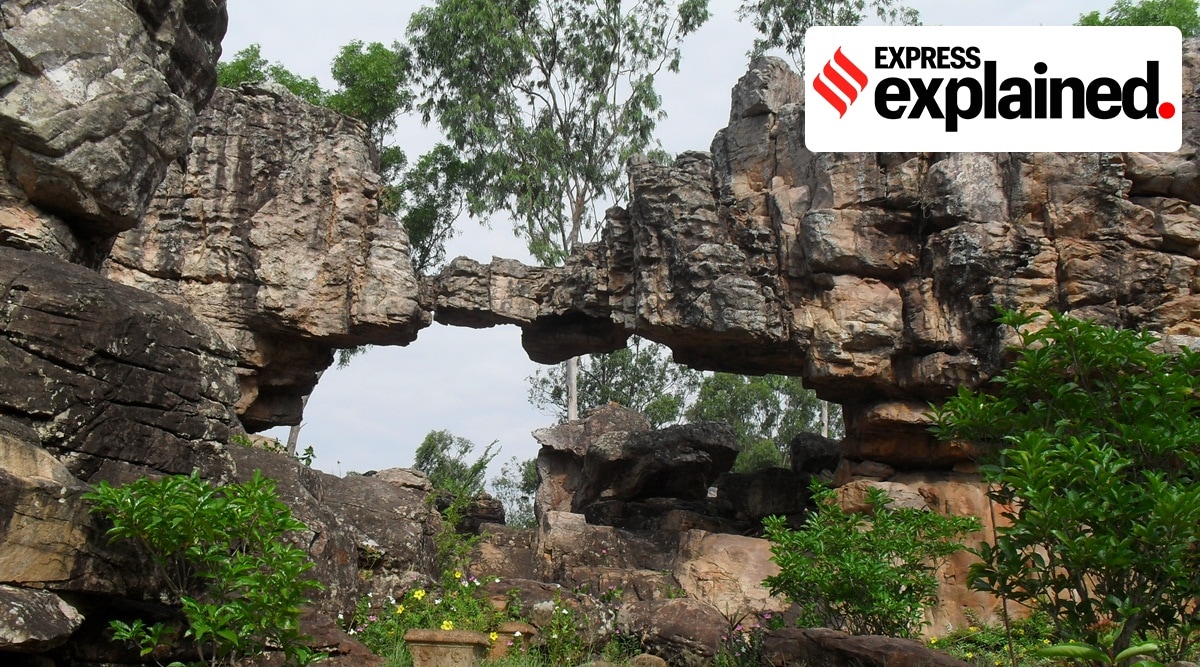What the Ministry of Mines’ draft Geo-heritage Sites and Geo-relics Bill says
The 32 geo-heritage sites spread across 13 states include the Volcanogenic bedded Barytes of Mangampeta in the Cuddapah district of Andhra Pradesh, the Akal Fossil Wood Park in Rajasthan's Jaisalmer, and others.

Today (February 14) is the last day for comments and suggestions to be sent in for the draft Geo-heritage Sites and Geo-relics (Preservation and Maintenance) Bill, as notified by the Ministry of Mines.
The Bill is aimed at providing for the declaration, preservation, protection and maintenance of geo-heritage sites and geo-relics of national importance, for geological studies, education, research and awareness purposes.
The comments/suggestions should be sent by e-mail in an MS Office Word file to the following ID: dirtech.mom@nic.in with the subject of the e-mail as “Comments/ suggestions on the Draft Geoheritage Sites and Geo-relics (Preservation and Maintenance) Bill, 2022”.
Here are the key pointers of the draft Bill, and some of the criticisms that have emerged.
First, what are the Geo-heritage Sites and Geo-relics mentioned here?
According to a 2016 press release by the Ministry of Mines, the Geological Survey of India (GSI) declares geo-heritage sites/ national geological monuments for protection and maintenance. The GSI or the respective state governments take necessary measures to protect these sites.
Coming under the Ministry of Mines, the GSI was established in 1851 to investigate and assess coal and other mineral resources of the country through regional-level exploration.
The draft bill defines Geoheritage sites as “sites containing geo-relics and phenomena, stratigraphic type sections, geological structures and geomorphic landforms including caves, natural rock-sculptures of national and international interest; and includes such portion of land adjoining the site,” that may be required for their conservation or to access to such sites.
And, a Geo-relic is defined as “any relic or material of a geological significance or interest like sediments, rocks, minerals, meteorite or fossils”. The GSI will have the power to acquire geo-relics “for its preservation and maintenance”.
The 32 geo-heritage sites spread across 13 states include the Volcanogenic bedded Barytes of Mangampeta in Cuddapah district of Andhra Pradesh, the Akal Fossil Wood Park in Jaisalmer, Rajasthan and others. The full list is here.
What does the Geo-heritage Sites and Geo-relics Bill say?
The Bill states that despite identifying these sites, there are concerns over their preservation. “Due to the absence of any legislation in the country for the protection, preservation and maintenance of the geoheritage sites, these are increasingly threatened with destruction not only by the natural causes of decay but also by population pressure and changing social and economic conditions which is aggravating the situation.”
It states, “The fossil wealth of dinosaur remains of Madhya Pradesh and Gujarat, marine fossils of Kutch and Spiti…oldest life forms viz. stromatolites of Rajasthan and Madhya Pradesh…are of great geoheritage and geotourism value. The world’s oldest metallurgical records of gold, lead and zinc in Rajasthan and Andhra Pradesh are still preserved but are under great threat.”
What does it say regarding preservation?
The key proposals say:
*It would authorise the Central Government to declare a geoheritage site to be of national importance. This would be under the provisions of the Right to Fair Compensation and Transparency in Land Acquisition, Rehabilitation and Resettlement Act, 2013 (RFCTLARR Act). Through a public notification in the Official Gazette, the government would spell out what areas were to be acquired by it, and objections to this can be raised within two months.
*Provision is made for compensation to the owner or occupier of land who incurs loss or damage from the land due to the exercise of any power under this Act. The market value of any property will be ascertained in accordance with the principles set out in the RFCTLARR Act.
*The Bill imposes a prohibition on construction, reconstruction, repair or renovation of any building within the geoheritage site area or utilisation of such area in any other manner, except for construction for preservation and maintenance of geoheritage site or any public work essential to the public.
*Penalties for destruction, removal, defacement or contravention of any direction issued by the Director General, GSI in the geo-heritage site are mentioned. There is a penalty of imprisonment which may extend to six months or fine which may extend to Rs.5 lakh, or both. In the case of a continuing contravention, additional fine of upto Rs.50,000 for every day of continuing contravention may be imposed.
And what are the criticisms?
The need for the preservation of such sites, and particular laws for them, has been felt for long. But as a Science article points out, there are concerns over the distribution of power as mentioned in the Bill. Guntupalli V R Prasad, a paleontologist at the University of Delhi who was recently leading the team that discovered titanosaur nests in Madhya Pradesh, told Science, “The GSI has been given sweeping powers.”
It points to how the GSI has the authority to acquire any material of geological significance, including sediments, rocks, minerals, meteorites, and fossils, as well as sites of geological importance. The issue of land acquisition for the purpose of safeguarding these sites could also lead to issues with local communities.